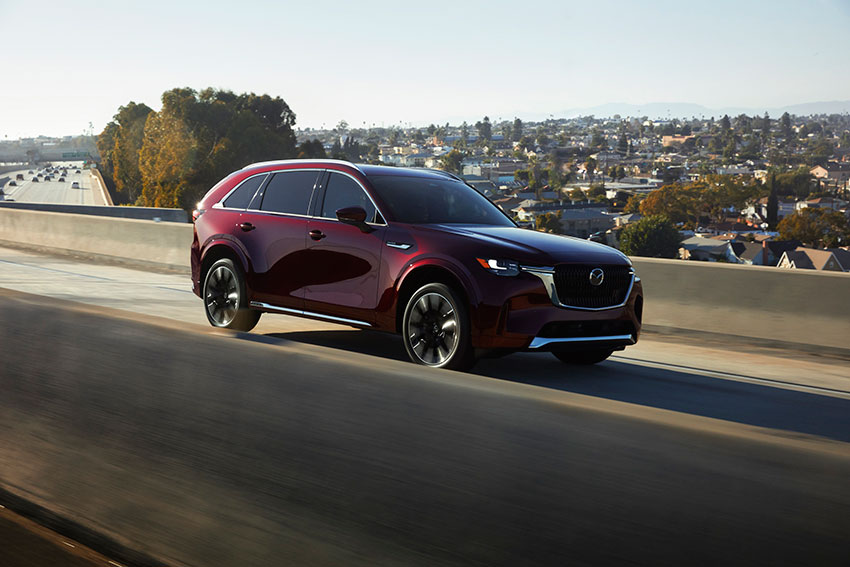In 2022, Mazda released its first Integrated Report – an opportunity for the company to unveil its vision for 2030 and to remind the world of the unique values the Mazda brand was built on.

In summer 2020, in the midst of the COVID-19 pandemic, healthcare workers across the United States could be seen driving their vehicles to Mazda dealerships. Surprisingly, two thirds of the automobiles lined up in front of Mazda’s shops had not been made by the Japanese manufacturer – so what exactly were they doing there?
The answer is the Essential Car Care program, an initiative that saw Mazda dealerships offer oil changes and deep-cleaning services free of charge to all healthcare workers, regardless of the cars they drove. Within 60 days of its launch, over 55,000 workers had taken advantage of the program. This anecdote offers a glimpse into one of the core tenets of the company, which celebrated its 100th anniversary that same year.
At Mazda, a focus on people – and the emotions they feel – is central to how the brand operates. “No matter what we do, be it manufacturing, R&D, sales, or distribution, we al- ways prioritize the human aspect of each element of business,” says Masahiro Moro, Mazda director and senior managing executive officer. “It’s a way of life for us.”
This ‘way of life’ is strongly reflected in Mazda’s Value Creation Process, which was outlined last year in the Hiroshima-based car maker’s first ever Integrated Report. Through its Value Creation Process, Mazda aims to bring the thrill of movement to its customers’ daily lives through exceptional engineering and manufacturing, and by creating human connections with its people-first approach.
The pursuit of this philosophy was the driving force behind the reforming of Mazda’s U.S. dealership network. As exemplified by the Car Care Program, the company focused on nurturing a community of trust between the brand and its customers, a strategy that led to improved quality of sales in the U.S., including higher profit per unit.
“We want to provide emotional excitement to the drivers who use our cars,” says Akira Marumoto, Mazda’s president. “From our engineering expertise to the in-store experiences we offer, we want people to feel that Mazda allows them to live a creative, spirited and enjoyable life through its vehicles.”
Safety is fundamental to feeling joy through vehicles, and the company’s Value Creation Process seeks to foster a safe automotive society. While this goal has prompted other manufacturers to pursue fully automated cars, Mazda’s human-centered philosophy has led it to develop assistive technology based on its Co-Pilot concept, which leaves the driving to the driver unless something goes wrong.
“We don’t intend to have people give up on driving and just use their cars to have a coffee or read a book,” Mr. Moro says. “Mazda simply isn’t that brand.”
The Co-Pilot concept is designed to monitor the driving environment and experience. When threats are detected, the technology seamlessly activates in order to protect the driver and those around. “For example, if a driver loses consciousness, the system takes over and navigates the car to a safe place,” Mr. Marumoto explains. “Once parked, the system automatically makes an emergency call, and alerts cars and people in the vicinity of the incident.”
With sustainability also integral to the Value Creation Process, Mazda is focused on becoming carbon neutral by 2050. A crucial step towards that objective, Mr. Moro notes, is achieving carbon neutrality at the company’s manufacturing plants. “We already know that over 70% of CO2 emissions are discharged from factories,” he says. “Converting our thermal plants is a key challenge for us. The first change will be to switch our usage of oil and coal to alternative sources.
“Secondly, we must reduce the CO2 emissions of our logistics network. To make the trucks and buses in the factories environmentally friendly, we have partnered with Euglena, a biofuel maker.
“Thirdly, we have made initiatives in renewable and clean energy. We are partnering with five prefectural governments, including Hiroshima, Yamaguchi, and Tottori, and with several other companies to set up a committee for energy transformation. We also collaborate with the Chugoku Electric Company to provide a more horizontal development system,” Mr. Moro concludes.
Whereas certain players in the automotive industry have made electrification their only product-development strategy, Mazda believes in adopting a flexible approach. “While energy policy and customer demands vary in each country, the purpose of electrification remains the same: to achieve carbon neutrality,” Mr. Marumoto says. “As such, there shouldn’t be a single, immutable approach to lowering emissions. Rather, there should be a tailored proposal that considers the specificities of each region and country.”
Based on this reasoning, Mazda has adopted a multi-solution strategy whereby all cars produced after 2030 will have some level of electrification, but the precise technology used – hybrid or full-fledged electric vehicles – will depend on the local energy situation and customer needs. “Although different vehicle types function according to different engineering designs and energy sources, Mazda has successfully created a common vehicle architecture supported by a flexible manufacturing concept,” Mr. Marumoto says.
While celebrating a centenary in the midst of a global lockdown is certainly not a pleasure, it provides an opportunity to reflect on the past and the future, and to look back on one’s existence. For Mazda, it was a chance to remind the world of what is most important to the company: people. “Mazda’s three core values that have been cultivated throughout its 100 years of history are: ‘deeper insight into people’, ‘co-creation with others’ and ‘never stop challenging’,” Mr. Marumoto says. “By passing on these values to the next generation and bringing more enjoyment to people’s everyday life, even as times and as the external environment change, Mazda, as a small player, will overcome a period of major change in the automotive industry.”
0 COMMENTS